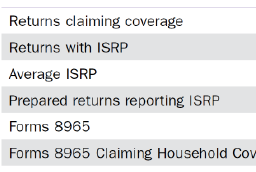
AFFORDABLE CARE ACT – INDIVIDUALS: The IRS Is Compromising Taxpayer Rights As It Continues to Administer the Premium Tax Credit and Individual Shared Responsibility Payment Provisions
Overall, the IRS has done a commendable job of implementing the first stages of the Patient Protection and Affordable Care Act of 2009. The 2015 filing season presented difficult challenges with the introduction of the Individual Shared Responsibility Payment (ISRP) and the Premium Tax Credit (PTC) on tax year 2014 federal income tax returns. While the IRS performed well overall in filing season 2015, several developments will likely result in significant burden imposed on both taxpayers and the IRS in future years.
For example, the pre-refund Automated Questionable Credit (AQC) procedures for PTC mismatches are identical to and impose the same burden as post-refund PTC examinations, yet the IRS maintains it can conduct both a pre-refund AQC review and a post-refund audit of another issue, thereby undermining the important statutory protection against multiple audits. The absence of the Second Lowest Cost Silver Plan (SLCSP) amounts on some Forms 1095-A are delaying the processing of PTC returns and imposing unnecessary burden on taxpayers.
The National Taxpayer Advocate has a number of recommendations, some of which include that the IRS take preventive measures to avoid ISRP overpayments in the future; issue guidance to field compliance employees to assist them in identifying returns with a tax liability resulting from the correction of Forms 1095 errors in the SLCSP information; and not pursue collection, including blocking the accounts from refund offsets.
